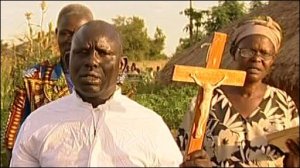Uganda is a deeply spiritual country. Almost 90% Christian with a sprinkling of Islam, the formal religions are supplemented with a hefty dose of ancient superstition. Witchdoctors and practitioners of herbal remedies abound. Due in part to the failure of the healthcare system to meet basic needs, many Ugandans still turn to ‘alternative’ medicines. Uganda is not necessarily anti-science, but science takes its place alongside superstition as a competing method of understanding the world.
Against this backdrop, you might expect the scientific explanation of climate change to fall on deaf ears. But in fact, indigenous knowledge in rural Uganda – built up over centuries of living in-synch with the natural environment, and often rooted in superstition and spirituality – is an ancient form of environmentalism.
Traditional Ugandan cultural institutions (that existed long before the Christian missionaries came to Africa) treated the natural environment with a great deal of respect. In an article for www.allAfrica.com, Robert Bakiika argues that ancient cultural knowledge is vital for managing climate change:
“Cultural institutions have played an important role in the context of climate change adaptation and mitigation such as implementation of forest protection policies and passing of information to generations…Recalling that part of Mpanga Forest Reserve in Mpigi District used to be a burial ground for some heads of cultural institutions, clearly shows that such institutions respected natural resource management.”
Ben Twinomugisha, a climate change activist from Kampala, suggests that it is not necessarily a problem if people apply non-scientific explanations to climate change.
“They might not know that it is caused by industrialisation, because most people have not seen industries in their areas. So they say ‘we cut trees, and God is telling us not to destroy trees around us, so now that’s why we are suffering’. Indigenous knowledge comes from the history of the people from generation to generation. When I look at your societies, most people don’t have a history. Here, our communities have been together for centuries, so there is an oral tradition from one generation to the next. I can tell you a story of the last 10,000 years….it shapes my mind.”
That kind of panoramic historical view on the changes that are taking place in Uganda today is an aid, not a barrier, to communicating climate change in Uganda. People know their natural history. They recall stories about climatic events. They understand that the environment must be cared for and respected if it is to serve its purpose for humans.
Climate change is not about predominantly about science in Uganda – it is about environmental stewardship. Whether that stewardship is motivated by rationalism or superstition, few seek to deny its importance. But it is sobering to consider that the ancient cultural institutions in Uganda that represent the nation’s environmental consciousness are being steadily eroded by the inevitable march towards industrialisation.
Development is understandably the highest priority in Uganda – and so industrialisation will be welcomed with open arms if it brings improvements in standards of living. But thanks to the unsustainable practices of developed nations, Uganda’s industrial revolution will be constrained by the need to buffer itself against the effects of climate change. The balancing act for Uganda – as with so many developing nations – is to develop in a way that does not compromise the well-being of future generations.
Sustainable development is an all-encompassing term that has come to mean almost nothing in countries like the UK, where corporate social responsibility means offsetting the staff Christmas party with a cheque made out to the Indonesian Orangutans. But in Uganda, sustainable development means something profound.


[…] This post was mentioned on Twitter by Adam Corner and Adam Corner, Adam Corner. Adam Corner said: New Hidden Heat blogpost: Indigenous knowledge & climate change in Uganda http://tinyurl.com/6yn9k49 […]